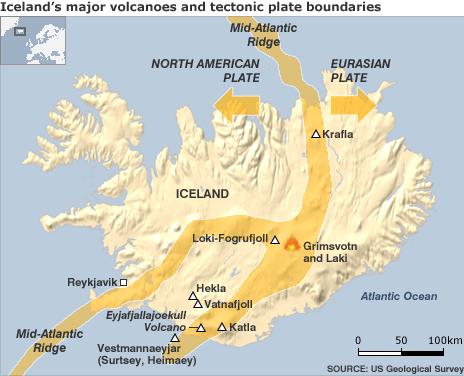Iceland volcano: Grimsvotn eruption hits flights
- Published
Matthew Roberts, Iceland's Met Office: "Eruption begining to decline in strength"
Iceland has closed its main international airport and cancelled domestic flights after its most active volcano, Grimsvotn, began erupting.
A plume of smoke has risen 20km (12 miles) into the sky from the volcano.
But Iceland's Meteorological Office says the eruption should not cause widespread disruption to air traffic.
Last year, ash clouds from another Icelandic volcano, Eyjafjallajokul, led to the closure of a large section of European airspace.
Governments feared that ash particles could cause aircraft engines to fail, and the closure caused chaos to air travellers.
Different ash
Hjordis Gudmundsdottir, a spokeswoman for the Isavia civil aviation authority said: "We have closed the area until we know better what effect the ash will have."
The authority said Keflavik airport, the country's main hub, would remain shut for the rest of Sunday.
But officials say the eruption is unlikely to have the same impact as Eyjafjallajokul in 2010.
University of Iceland geophysicist Magnus Tumi Gudmundsson said this was Grimsvotn's largest eruption for 100 years, "much bigger and more intensive than Eyjafjallajokull".
He added: "There is a very large area in south-east Iceland where there is almost total darkness and heavy fall of ash. But it is not spreading nearly as much. The winds are not as strong as they were in Eyjafjallajokull."
He said this ash was coarser than last year's eruption, falling to the ground more quickly instead of floating long distances.
Europe's air traffic control organisation said on Sunday: "There is currently no impact on European or trans-Atlantic flights and the situation is expected to remain so for the next 24 hours.
"Aircraft operators are constantly being kept informed of the evolving situation."
However, weather officials warned that ash could reach northern Scotland by Tuesday and other parts of Britain, France and Spain by Thursday or Friday if the eruption continues at the same rate, according to Reuters.
In Scotland, a meeting of the government's resilience committee chaired by Transport Secretary Keith Brown is currently being held to discuss the possible impact.
Threat to engines
Grimsvotn lies under the the largest glacier in Europe, Vatnajokull in south-east Iceland.
When it last erupted in 2004, transatlantic flights had to be re-routed south of Iceland, but no airports were closed.
Last year's outpouring of ash from Eyjafjallajokull led to the largest closure of European airspace since World War II.
About 10 million travellers were affected and some questioned whether the shutdown was an over-reaction.
However, a scientific study published last month said the safety concerns had been well founded.
Researchers from the University of Copenhagen and the University of Iceland said ash particles from the early part of the Eyjafjallajokull eruption were especially abrasive, posing a possible threat to aircraft engines.

- Published25 April 2011